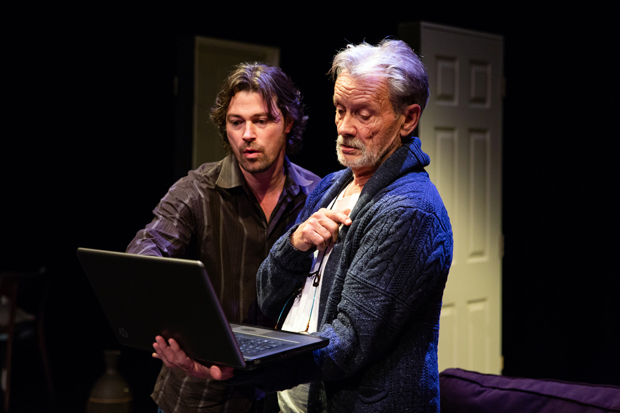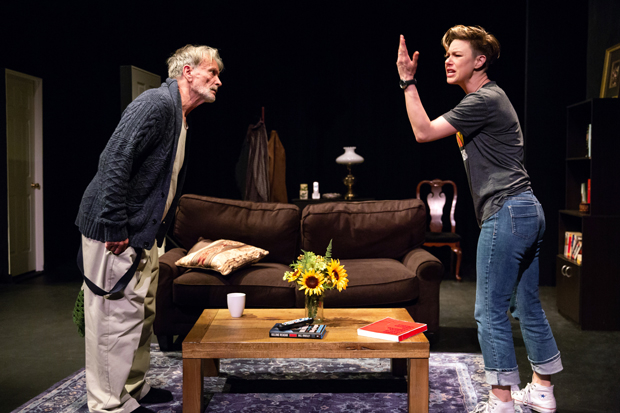The Bigot Offers an Updated Version of All in the Family
”Straight White Men”’s Stephen Payne plays a modern-day Archie Bunker in this new play by Gabi and Eva Mor.

(© Jeremy Daniel)
The Bigot focuses on a working-class father with a bevy of societal prejudices who finds his narrow-minded perspectives challenged by family members and neighbors. Sound familiar? Gabi and Eva Mor's new play offers a present-day version of the '70s TV sitcom All in the Family, with Jim (Stephen Payne) the resident Archie Bunker hurling racist and homophobic invective at his son, Seth (Dana Watkins), and at the interracial lesbian couple living next door, Paula (Jaimi Paige) and Aysha (Faiven Feshazion). But the sitcomlike nature of The Bigot is evident not just in its thin characterizations and tidy plotting, but in a worldview that is near-offensive in its simple-mindedness.
Jim may represent strains of bigotry that have been inflamed in the US in recent years, but as the Mors have written him, he's defined so exclusively by his prejudices that he comes off as just a straw man for the other three characters to easily show off their enlightened wokeness. Not that the other characters are any more three-dimensional. Seth is a history teacher, a fact that offers a convenient justification for baldly didactic scenes in which he and Jim go back and forth with their conflicting views of slavery, Martin Luther King Jr., and other such flashpoints in the history of American race relations. He barely seems to have an existence outside of his fraught relationship with Jim, though. Neither does Paula or Aysha, with the latter functioning as the more rational yang to the former's idealistic yin, especially when Paula, who at one point describes herself as a "gay Mary Poppins," takes it upon herself to try to forge a personal connection with him, to Aysha's understandable disapproval.

(© Jeremy Daniel)
A storyline develops regarding Seth's search to find a donor match for Jim's failing kidney. The way in which this search for a kidney donor eventually intersects with the play's interest in having characters teach Jim the errors of his bigoted ways is ridiculously contrived, not to mention utterly predictable. Even worse than the schematic plotting, however, is the insultingly pat way in which the playwrights try to "explain" the characters' behavior, with the usual dead relatives and daddy issues informing the motivations of these characters. Such psychological shortcuts are par for the course in a play that intends to comfort rather than disturb: one in which the messiness of real life is never allowed to complicate emotional responses.
But then, entertaining anything approaching real-world nuance would detract from the message the Mors are trying to impart: that all it takes to melt away even the hardest of racially and sexually intolerant hearts is just a little bit of understanding. In the world of The Bigot, even racism and homophobia could be easily solved if people just tried a little tenderness. Considering how divisive our country remains these days, it's difficult to see this vision of the world as anything other than naive wish fulfillment. Though the Mors, in a playwrights' note in the program, say that The Bigot was inspired "from our own personal experiences" and that "bigotry was no stranger in our own lives," none of that sense of anguished personal experience is evident in this neatly manicured 90-minute glorified sitcom episode.
And Michael Susko has directed it like a sitcom. The Bigot supposedly takes place in Brooklyn, but Adam Crinson's generic-looking domestic set — with one half of the stage representing Jim's messy digs and the other half representing Paula and Aysha's much cleaner space — makes it look like it could take place anywhere. Each scene change is even denoted by ironically jazzy bumper music à la Everybody Loves Raymond (Matt Locker is credited with the show's sound). As a result, we feel like we're simply the live studio audience of a TV show, albeit one without cameras and without any jokes that inspire actual laughter. Amid such clichéd material, this quartet of talented actors bring all the conviction they can muster. Payne, in particular, brings the same gruff authenticity that he brought as the father in Straight White Men on Broadway last year — so much so that at times he almost makes us believe in the dewy-eyed platitudes that the Mors are trying to sell.

(© Jeremy Daniel)








